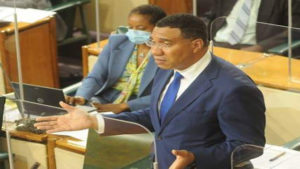 WITH Jamaica inching back to normality amidst Government’s decision to further relax COVID-19 restrictions, Prime Minister Andrew Holness last night warned the country not to abandon caution, stressing that a spike in infections this summer could mean sacrificing plans for the reopening of face-to-face learning for all schools come September.
WITH Jamaica inching back to normality amidst Government’s decision to further relax COVID-19 restrictions, Prime Minister Andrew Holness last night warned the country not to abandon caution, stressing that a spike in infections this summer could mean sacrificing plans for the reopening of face-to-face learning for all schools come September.
“I want to urge caution; this is not a time for complacency. As we move to the next phase of the management of the virus we will have to be even more vigilant. Our positivity rate is still higher than five per cent, only a small percentage of our population has been fully vaccinated and there are many new variants of concern in other countries that are even more transmissible than the ones we have seen locally,” Holness emphasised.
The prime minister’s warning came during an update to Parliament on the pending adjustments to the existing Disaster Risk Management Order to phase in new measures, among them plans for the reopening of the entertainment sector. The prime minister, ahead of outlining the adjustments, noted, that “as much as the entertainment sector has suffered, the education sector has suffered even more”.
Said Holness: “If we have a significant spike over the summer it could impact our ability to reopen schools for face-to-face learning in September. I would not want to consider that entertainment is a trade-off with education. So it is imperative that for persons who seek or organise and manage and put on events, we have to be even more vigilant.”
Noting that it was not far-fetched that hospitalisations could soar out of control as in the second wave experienced by the country recently, the prime minister said, “the risk of a third wave is ever present.”
In the meantime, he said the existing work-from-home directive in the public sector, which is being extended until August 10, will be lifted once the drive to vaccinate the elderly, teachers, health-care and security personnel is accomplished. The focus then, he said, would be shifted to vaccinating the remaining public sector workers.
“We will then plan to lift the work-from-home directive at that point in time. We will hold the work-from-home for now, but as soon as as we have enough vaccines, and we have completed the public health workers, the aged 60 and over, the soldiers and the police and the other non-civilian groups, we will turn our attention to the critical service workers, then we can lift the work-from-home. It is important that it is calibrated because our plan is also to return to school in September,” the prime minister added.
Opposition Leader Mark Golding, while noting the Government’s efforts to return the country to normality, warned that the country was in a tenuous position.
“The reality is that Jamaica is skating on very thin ice. We all know that resilience and a restoration of normalcy to the economy and life in general depends on building up sufficient levels of immunity in the population so that COVID is no longer a threat to life,” Golding pointed out, adding that Jamaica is lagging behind the rest of the region in its vaccination efforts.
“We are worst in class in the western hemisphere in terms of the percentage of the population that has been vaccinated so far. We are hoping and seeking to open up when we are very, very vulnerable, and we can only hope that the individual levels of personal responsibility the prime minister has called for, and which I repeat as leader of the Opposition, [are] indeed practised by all.”
“We know internationally that the advent of strains, mutations, the Delta one in particular… is impacting even societies where there has been substantial progress in vaccinations, but amongst those pockets which have not been vaccinated it is spreading like wildfire. We are an island, we are a very open economy, we rely on visitors, we have a huge diaspora, many of whom visit regularly; and we are very vulnerable,” Golding stated.
He noted that while the data suggests that Jamaica has not yet been impacted by the variant it is still in a precarious position.
“We are skating on thin ice until we sort out our vaccination programme, and part of that is supply,” he said, pointing to the current shortage of vaccines which resulted in some individuals, including the elderly, being unable to receive their second doses on schedule.
“It was chaotic and it was not a good look,” he said, urging that more steps be taken to rapidly source and acquire more vaccines and encourage people to take the vaccine.
